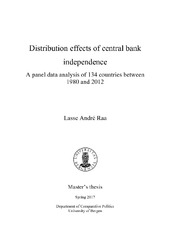Distribution effects of central bank independence: A panel data analysis of 134 countries between 1980 and 2012
Master thesis
Permanent lenke
https://hdl.handle.net/1956/16089Utgivelsesdato
2017-06-21Metadata
Vis full innførselSamlinger
Sammendrag
Increasing inequality within countries has been put on the agenda in recent years, much due to the impact of Thomas Piketty’s Capital in the Twenty-First Century. The distributive effects of central bank independence have however been largely ignored by economists and political scientists alike, focusing solely on fiscal policy, i.e. taxation and spending, as a means of redistribution. Using a regression model of 134 countries during the period between 1980 and 2012, I find that central bank independence has a positive, significant effect on market inequality, i.e. inequality before taxes and transfers, producing more inequality. The effect diminishes with higher levels of inflation. The results are robust to trends, different magnitudes of lag, exclusion of a control variable reducing the amount of observations substantially, and to different inflation measures. The effect is not present when the dependent variable is exchanged with a net inequality measure, i.e. inequality after taxes and transfers. As both redistribution, market inequality and central bank independence have increased in the period, this indicates that redistributive taxation and transfers pulls in the opposite direction, reducing inequality. I suggest that due to efficiency and justice issues relating to redistributive taxation and transfers, it may be favorable to adjust inequalities ex ante, i.e. through monetary policy, rather than ex post, i.e. through fiscal policy. The alternative may be a vicious cycle of increasing central bank independence, inequality and redistributive taxation. The findings also have strong implications for the debate regarding central banks’ mandates and the balance between central bank independence and democratic accountability.
